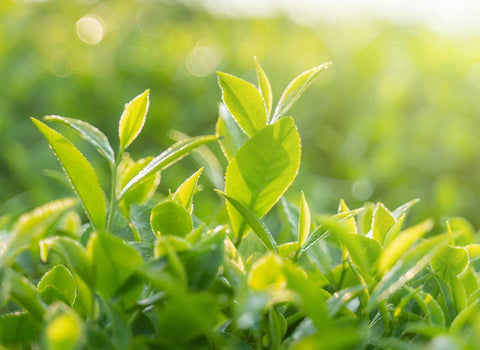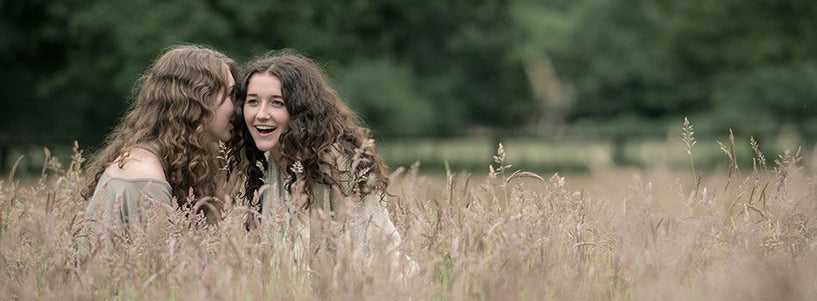This guide for teenage skin helps you to understand what causes acne, spots and blemishes and how to get teenage spots under control. We take a look at what causes acne, and what natural ingredients can help you to tackle teenage skin problems and achieve a blemish-free complexion.
Oy natural skin care for teenage spots
With up to 60% of what you put on your skin absorbed into your bloodstream, it's never too early to start an organic skin care regime that avoids harsh, artificial chemicals.
Organic Young (Oy) is a range of organic skin care for teenagers which is brimming over with natural active ingredients selected for their punch in the fight for a clear complexion.
"Black Willow Bark, Green Tea and Prebiotics are kind to your skin and effective against spots"
We believe in using ingredients like Black Willow Bark, Green Tea and Prebiotics which are kind to the skin and are extremely effective in combating acne and spots.
We also use Rosehip oil, which helps to prevent spot blemishes and scarring thanks to its amazing ability to encourage tissue regeneration.
See full Oy! skin care range now.
How does Oy natural skin care work?
Here’s a little information on some of the ingredients we use in our organic skin care for spots and acne-prone skin:
Prebiotics – These encourage and support the skin’s colony of good bacteria, assisting them in the fight against the bad bacteria which cause teenage spots.
Tea Tree Extract – This contains compounds that have powerful antibacterial properties to control the bacteria that lead to acne formation. Unlike many synthetic antibacterial agents, Tea Tree extract does not irritate the skin and will not cause dryness or inflammation.

Green Tea – Green Tea is an anti-inflammatory so helps to calm the red, sore spots and blemishes associated with acne. It also helps to prevent skin damage from free-radical activity.
Black Willow Bark – Black Willow Bark is a true wonder ingredient! Like Green Tea, it helps to calm inflammation, but it also helps to fight acne bacteria and exfoliates the skin too! It also helps to regulate sebum production to balance the skin and reduce oiliness.
Rosehip oil – Rosehip Oil is special because it allows the skin to regenerate, helping it to recover from blemishes. It also moisturises, soothes and softens, promoting a healthy skin condition.
What causes teenage spots and acne?
Spots and acne generally affect people in their teens and early 20s but people of any age can develop them.
It’s hard to pin down any one reason why someone develops acne or spots but poor eating habits, hormones, genetics, poor digestion, heavy make-up, unwashed make-up brushes and harsh, pore-clogging skin care products can all contribute to creating the right skin environment for the acne bacteria to take hold.
"Acne and spots are caused by a combination of three factors - sebum, dead skin cells and the bacteria Propionibacterium acnes."
When sebum, a natural moisturiser excreted by your skin, is over-produced not only will your skin be visibly oily, but pores are also likely to become blocked. This leads to spots and blackheads.
Similarly, your skin shedding too many dead cells may also result in a spot outbreak.
Your skin sheds billions of cells each day in order to keep itself healthy, but a slight imbalance will cause too many cells to be shed, leaving some trapped in pores and follicles where they form the breeding ground for spots.
Lastly, the bacteria Propionibacterium acnes ( P. acnes) are found all over even the cleanest skin, but during an acne outbreak their population vastly increases. P. acnes feed on sebum, and when sebum accumulates in a pore they have an all-you-can-eat buffet.
After they feed they produce fatty acids, which irritate pores and cause them to become red and inflamed. The redness, soreness and swelling that comes with blemishes is largely a result of P. acnes gorging themselves.
Despite the fact that these three things are responsible for acne, sebum, skin cell renewal and even P. acnes are all part of healthy skin. The key is balance - too much or too little of any will lead to consequences for your skin.
You are more likely to suffer with acne during your teenage years because of the changes going on in your body. The level of sebum being produced increases, and the pores on your skin get blocked by a combination of this and dead skin cells. This imbalance of sebum and dead skin cells is what causes acne to be a particular problem for teenage skin.
Acne myths
Many people don’t know what causes acne and can jump to the wrong conclusions. Here are our reactions to some of the commonly held beliefs about acne:
- You can catch it by contact. Wrong! Everyone has acne bacteria on their skin but if the conditions aren’t right, they aren’t a problem.
- Acne is caused by poor hygiene. Wrong! Dirt is not the cause of acne and washing more won’t make it go away – in fact washing too much can cause your skin to produce even more oil!
- There is nothing you can do about it. Wrong!
The right diet and the right skin care regime can help you to get your acne under control, although it may not disappear altogether.
Blemish-fighting tips for teenage skin
Most teens will have oily skin at some time or other as your hormones can cause your sebaceous glands to over-produce sebum. Although there isn’t much you can do about your hormones there is plenty you can do to reduce that shine and take control of your teenage skin with a good skin care regime.
- Wash your face twice a day using a gentle cleanser with ingredients such as Green Tea, an anti-inflammatory to calm spots, and Willow Bark extract, which kills acne bacteria. Try Oy Foaming Clear Skin Face Wash
- Use a moisturiser as your skin still needs nourishment and balance. Try Oy Clear Skin Cleansing Moisturiser
- Use a deep-cleansing mask twice a week
- Avoid petroleum and mineral oil-based ingredients at all costs, as these will just block up your pores more
- Use warm water when you are going through your skin care routine rather than hot
- Don’t go to bed with your make up on. Always cleanse before bedtime, as well as in the morning
- Try not to touch your face too much. This transfers bacteria to your skin, making spots more likely
- Drink filtered water – and plenty of it. Water is great for your skin and filtering it will take out all the impurities
- Eat plenty of leafy greens, fresh fruit and foods rich in Omega-3. Vitamin B2 deficiency has been linked with oily skin too so you might like to try eating more whole wheat, beans and nuts, which are rich in it.
- Avoid junk food, highly-seasoned and fried food, soft drinks and sugar. When you get tempted, just think how much good you are doing your skin!
Natural products for teenage skin
Need some advice?
We're always happy to help you find the right products for your skin. Get help on products for teenage spots by chatting to us on social @GreenPeopleUK.













